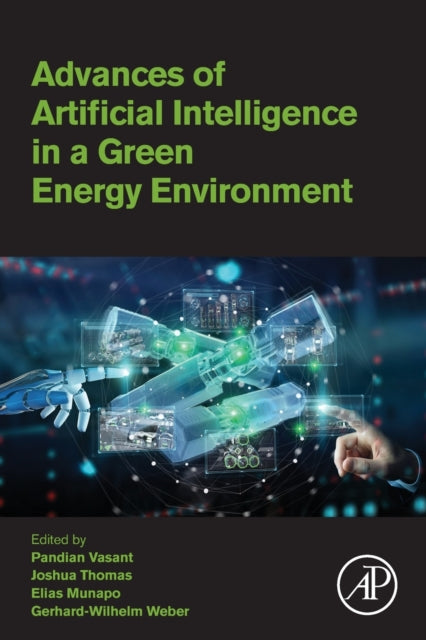Shulph Ink
Advances of Artificial Intelligence in a Green Energy Environment
Advances of Artificial Intelligence in a Green Energy Environment
YOU SAVE £7.94
- Condition: Brand new
- UK Delivery times: Usually arrives within 2 - 3 working days
- UK Shipping: Fee starts at £2.39. Subject to product weight & dimension
Bulk ordering. Want 15 or more copies? Get a personalised quote and bigger discounts. Learn more about bulk orders.
Couldn't load pickup availability
- More about Advances of Artificial Intelligence in a Green Energy Environment
Advancements of Artificial Intelligence in a Green Energy Environment explores how intelligent computing and AI are reducing data coverage worldwide, and how they can be applied in energy engineering to address uncertainty. It covers distributed energy systems, hybrid renewable energy systems, and blockchain technology in smart energy.
Format: Paperback / softback
Length: 414 pages
Publication date: 01 June 2022
Publisher: Elsevier Science & Technology
The advancements of artificial intelligence (AI) in a green energy environment have garnered significant attention in recent years. This handbook explores the emerging technologies in intelligent computing and AI that are revolutionizing the scope of data coverage worldwide. It provides a comprehensive overview of intelligent optimization algorithms that can be applied across diverse branches of energy engineering, particularly in areas where uncertainty poses significant challenges.
By incorporating AI methodologies and leveraging advanced evolutionary algorithms, this book delves into real-world application problems for everyday life applications. It examines distributed energy systems, hybrid renewable energy systems utilizing AI techniques, and the emerging opportunities in blockchain technology for smart energy. The book covers state-of-the-art developments in this rapidly evolving technology, making it an invaluable resource for engineering students and researchers actively engaged in the AI industry.
The significance of AI in the green energy sector cannot be overstated. By leveraging its capabilities, we can optimize energy production, reduce waste, and enhance sustainability. AI algorithms can analyze vast amounts of data from renewable energy sources, such as solar and wind power, to predict weather patterns and optimize energy generation. This leads to more efficient and reliable energy systems, reducing the carbon footprint and promoting a cleaner and more sustainable future.
Furthermore, AI can be used to improve the efficiency of energy distribution and storage. By analyzing energy consumption patterns and predicting demand, AI algorithms can optimize energy distribution networks, reducing energy loss and improving the reliability of power supply. This not only benefits consumers but also helps to stabilize the grid and reduce the impact of power outages.
In addition to its applications in energy production and distribution, AI is also being used to develop new renewable energy technologies. For example, AI algorithms are being used to optimize the design and performance of solar panels, wind turbines, and other renewable energy devices. This leads to more efficient and cost-effective renewable energy solutions, making them more accessible to communities around the world.
However, the development and implementation of AI in the green energy sector also present several challenges. One of the main challenges is the need for large amounts of data and computing power. AI algorithms require extensive datasets to train and optimize, which can be costly and time-consuming to acquire. Additionally, the processing power required for AI algorithms can be significant, particularly for large-scale energy systems.
Another challenge is the ethical considerations associated with AI. As AI algorithms become more advanced, they may make decisions that have significant impacts on human lives and the environment. It is important to ensure that AI algorithms are developed and implemented in a responsible and ethical manner, with consideration for the potential risks and benefits.
To address these challenges, there is a need for ongoing research and development in the field of AI for green energy. This includes the development of new algorithms and techniques that can handle large datasets and complex energy systems, as well as the establishment of ethical guidelines and regulations for the development and implementation of AI in the energy sector.
In conclusion, the advancements of artificial intelligence in a green energy environment have the potential to transform the way we produce and consume energy. By leveraging AI algorithms and advanced evolutionary algorithms, we can optimize energy production, reduce waste, and enhance sustainability. However, there are also challenges that need to be addressed, such as the need for large amounts of data and computing power, and the ethical considerations associated with AI. Through ongoing research and development, we can overcome these challenges and create a more sustainable and efficient energy system for the future.
Weight: 450g
Dimension: 229 x 152 (mm)
ISBN-13: 9780323897853
This item can be found in:
UK and International shipping information
UK and International shipping information
UK Delivery and returns information:
- Delivery within 2 - 3 days when ordering in the UK.
- Shipping fee for UK customers from £2.39. Fully tracked shipping service available.
- Returns policy: Return within 30 days of receipt for full refund.
International deliveries:
Shulph Ink now ships to Australia, Belgium, Canada, France, Germany, Ireland, Italy, India, Luxembourg Saudi Arabia, Singapore, Spain, Netherlands, New Zealand, United Arab Emirates, United States of America.
- Delivery times: within 5 - 10 days for international orders.
- Shipping fee: charges vary for overseas orders. Only tracked services are available for most international orders. Some countries have untracked shipping options.
- Customs charges: If ordering to addresses outside the United Kingdom, you may or may not incur additional customs and duties fees during local delivery.


